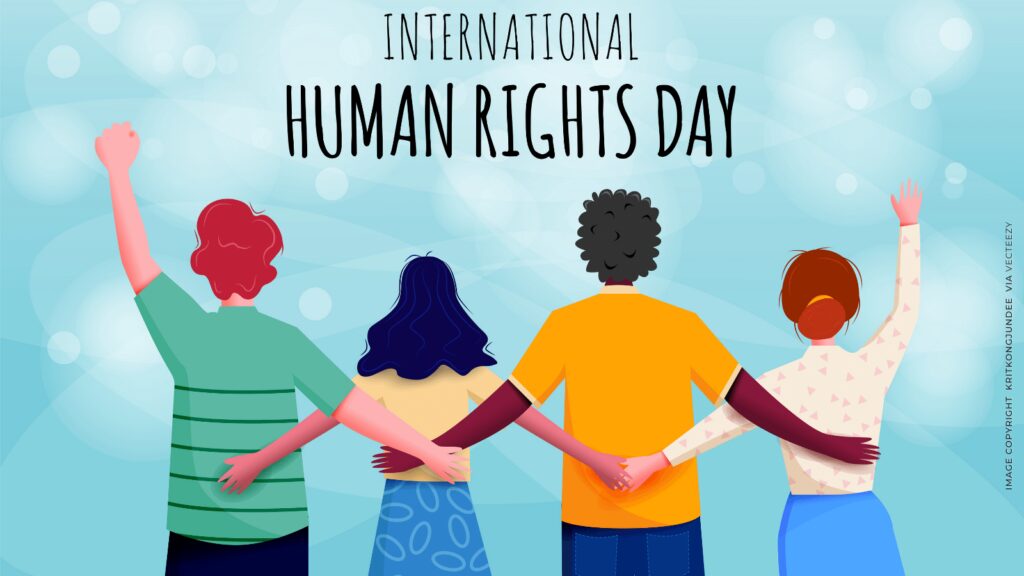Human Rights Day is observed every year on 10 December. This year theme relates to to the COVID-19 pandemic and focuses on the need to rebuild and recover better by ensuring Human Rights are central to recovery efforts.
Started in 1948, the United Nations released the Universal Declaration of Human Rights, which explicitly states the rights that all human beings are born with, “regardless of race, colour, religion, sex, language, political or other opinion, national or social origin, property, birth or other status.” The document itself is the most translated document in the world, available in over 500 languages. Former First Lady Eleanor Roosevelt played a key role in the creation of Human Rights Day, as she chaired the committee that wrote the declaration.
How Covid-19 Has Been Battering Human Rights
The Covid-19 pandemic is likely to reverse 15 year-long global efforts to improve social and economic rights and living standard. Estimated 71 million people are pushed back to extreme poverty in 2020, the first escalation of global poverty since 1998. In some countries, the adverse impacts could result in the same poverty status dating back to 30 years ago. Antonio Gutteres, The Secretary-General stressed that Covid-19 direct and indirect impacts are not affecting everyone the same. It has, however, aggravated pre-existing inequalities and injustice. Vulnerable groups – children, women, elderlies, people with disabilities, migrants and refugees, are enduring the most repercussions of this pandemic.
For Whom The “Stay At Home” Suggestion Is For
As the Universal Declaration of Human Rights (UDHR) issued under Article 25 (1) :
Everyone has the right to a standard of living adequate for the health and well-being of himself and of this family, including food, clothing, housing and medical care and necessary social services, and the right to security in the event of unemployment, sickness, disability, widowhood, old age or other lack of livelihood in circumstances beyond his control.
Ensuring equal and inclusive access to adequate living for health and well-being and without discrimination has been a challenging task for the governments and communities especially during and in post Covid-19 world.
The ongoing suggest to stay at home is not accessible for everyone, apparently. With the pre-existing number 2 percent of the world’s population before the pandemic were homeless, many rely on various-places that still offer safe drinking water and sanitation, internet access, electrical outlets, and free meals mostly from libraries and coffeeshops. Not to mention that provided shelters for informal housings are most likely to be overcrowded, leaving homeless people no option but to stay in open spaces or cars, if any.
Emerging data shows that outbreak of Covid-19 escalates the numbers of violence against women in domestic violence. They are hampered from a accessing help and basic hygiene. Singapore helpline has registered an increase in calls by 33 percent. In Jakarta there are 59 domestic violence cases, rape, and sexual harassment registered dating from March 16th to March 30th. It is also registered that women are staying from healthcare services to avoid the risk of contracting the disease.
Gaps in Social and Cultural Rights
Covid-19 pandemic also brought exceptional disruption to education rights, as 152 billion of children are affected by the closing of schools. Lacks of computers and internet access in remote learning makes it challenging to create inclusive education. In March, UNESCO estimated that girls who are taken the access of education face more likeliness of female genital mutilation (FGM) and early marriage.
Under the suggestion for lockdown, indigenous people who have been facing food, tenure, and land fragility also suffer from cases of harassment and threats. In Cambodia, illegal logging in the home of Key indigenous people, is still ongoing despite being protected under Wildlife Sanctuary in 2016. According to environmental activists, such the Prey Lang Community Network (PLCN), the forest loss spiked albeit under Covid-19 pandemic.
Contributing to the cause of high mortality rates to indigenous people under Covid-19 pandemic, mal/undernutrition, lack access to sanitation and clean water, and the closeness of contact also adverse the pre-existing vulnerability of indigenous people.
Road To Recover and Rebuild Better
As the pandemic enhances pre-existing crisis, exposing inequalities and social, political, and economical vulnerabilities, governments have been facing huge challenge in making immediate policy. However, it has also becoming an excuse for human rights violation in finding loopholes to benefit themselves. Ranging from corruption, additional powers given to law enforcement and military without transparent motives, and arbitrary arrests and fines must be diminished to best create coherent measures in relieving Covid-19 impacts.
According to UN Secretary General, Antonio Gutteres, “The virus threatens everyone. Human rights uplift everyone. By respecting human rights in this time of crisis. we will build more effective and inclusive solutions for the emergency of today and the recovery for tomorrow. This year Human Rights Day theme relates to the COVID-19 pandemic and focuses on the need to build back better by ensuring Human Rights are central to recovery efforts.



